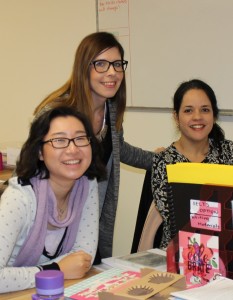 Do you know why lovely Langports teachers and support staff ask you not to speak in your native language at school?
Do you know why lovely Langports teachers and support staff ask you not to speak in your native language at school?
Do you know why are we so determined to make you speak English as much as possible?
You are responsible for your learning progress!
At Langports, you are lucky enough to say that you share your school with over 25 different nationalities from around the world and usually with around 6 or 7 different nationalities in each class. Great news for practising English! But what about when class finishes? You might think that during all those times when you’re not in the classroom; in the morning, break times, lunch time and even when you are just walking around school, that there is no problem in speaking your native language. In some ways that may be true. Using your own language isn’t going to stop you from learning English but it will make the learning process slower. It could also make people who do not share your language feel lonely and that they can’t talk to you.
Be honest — when you decided to travel to Australia and learn English at Langports, you probably weren’t thinking about the friends you would meet from the same country as you. You probably thought you would meet lots of people from all over the world and learn about other cultures. This is all possible at Langports and especially in a country as multi-cultural as Australia. We understand that you will naturally make friends with people from the same country as you because you share some similar experiences and understanding. But to really make the most of your opportunity at Langports, you should try to speak to as many people as possible from different countries, of different ages and with different levels of English. Why? Because that is what you have paid for!
 The two winners of our English only competition held in January on the Gold Coast.
The two winners of our English only competition held in January on the Gold Coast.
The more you are exposed to a new language, the quicker you will learn.
Sure, there are moments when you just can’t find the words to ask for the … (what’s that word again?) or you need to go to the … (can’t remember that one either) and you just can’t find the words you want in English. However, by trying to explain yourself in English and ‘problem-solving’ you are increasing your ability to think in English and understand English in different ways.
Lots of linguists (people who study languages and language learning) have said that they believe it is better to use the language you are trying to learn, rather than your first language. Beardsmore (1982) suggests that many difficulties a language learner has with the phonology (sounds), vocabulary and grammar of the second language are due to the interference of habits in your first language. This means that trying to understand English by translating back to your own language isn’t always helpful and can lead to misunderstanding. Krashen (1985) also believes that you need “maximum exposure” to a new language in order to learn it.
We value all our students and try very hard to make sure you have the best experience possible at Langports. We love learning about your cultures and goals and we want to help you on your English language journey. We really do believe that our English Only Policy is one way to maximise your progress.
 Congratulations to our awesome English speakers (Gold Coast campus)!
Congratulations to our awesome English speakers (Gold Coast campus)!
Challenge yourself to achieve your best.
So if after reading this you are still not convinced that you should only speak English at school, give it a try for one week. Promise yourself that you won’t use your first language at school, unless you have an urgent problem. In just a few weeks, you should notice more progress!
Would you like to improve your English skills? Read more of our blogs articles written by our Academic Teams: